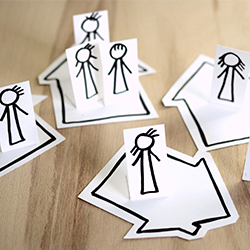Menu
Close

I’m feeling stressed due to the pandemic
Mar 18, 2020
I’m feeling stressed due to the pandemic. Is this normal?
A pandemic is a very stressful event for individuals and communities, so it’s normal to feel some stress and anxiety. It is also important to note that it’s also common for people to display great resiliency during times of crisis.
Some groups may be more likely to feel that the stress is overwhelming or harming their mental health, including:
- Older people or those at higher risk from COVID-19;
- Children and teenagers;
- First responders, health-care providers and others who are helping with their community’s response to the disease;
- People with pre-existing mental health problems or mental illnesses, including histories of problematic substance use.
How might stress related to the pandemic affect me?
- It’s common to see fear and worry, especially focused on one’s own health and the health of loved ones. For some people these worries can become excessive, and affect how we function in our daily lives.
- It can be difficult to relax and to get the normal amount of sleep, or to get restful sleep, and your appetite and eating habits can also be affected. Disruptions to one’s eating and sleeping routine, and a lack of exercise, can have a negative effect on your general or overall health, as well as your immune system.
- Being stressed out can worsen the symptoms of existing chronic health problems, including mental health problems. It’s important to stay with any treatment and to monitor your condition.
- For some people we can see an increase in the use of substances such as tobacco, alcohol and other drugs.
- Keep in mind that relying on alcohol, tobacco or drugs to manage stress can have a number of negative effects on health.
- Feeling stressed and afraid – as well as self-isolation and social distancing – can make it difficult to maintain close social relationships, and those are important to well–being and to maintaining our resilience in the face of a crisis.
What can I do to ease my mind?
- Accept that it’s okay to be worried; it’s normal to feel some anxiety about a situation like this.
- Take breaks from following the news and social media regarding the outbreak. It’s important to be informed, but there’s evidence that hearing constantly about an upsetting event can worsen the stress and worry – beyond what’s necessarily appropriate and proportionate. Could you limit your check-in to one reliable source, once a day?
- When you do follow the news, get your information from reliable sources, such as public health agencies and officials.
- Practice self-care. Get enough sleep, eat healthy, exercise (including by going outdoors while following public health directives) and do things you enjoy.
- This is absolutely the time to lean on each other. Even if we can’t be close physically with one another, we need to stay close emotionally. Stay in touch with your social network and reach out for social support.
- One way to do this is to discuss a buddy system in which you agree to check in on each other and run essential errands if you become sick.
- Stay focused on what is within your control:
- Follow the precautions set out by Health Canada and your public health agencies: wash your hands, cover your mouth during coughs and sneezes, avoid non-essential travel, etc.
Reach out if you need to
- Seek help if you’re experiencing significant mental distress, such as worsening symptoms of anxiety or depression that were previously unrelated to the current situation.
- If you are experiencing significant distress, reach out for formal mental health supports from a health care professional or a recognized agency, such as your local CMHA. Find your local CMHA at www.cmha.ca/find-your-cmha
